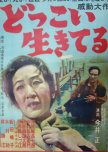"There's no such thing as easy anywhere these days"
Dokkoi Ikiteru aka I Still Live was a painful look at the most vulnerable in Japan post WWII. Director Imai Tadashi who dove into socially conscious movies after the war, made this film outside of the major studios. I will admit to only grasping the large parts of the film as the only available copy I could find used auto-generated English subtitles which were lacking to say the least. Until such time as someone who watches this who speaks Japanese or there is an adequate translation, I’ll leave a quick review for those who might be interested in this film.
The film centers on a Japanese family of four. They initially live in a small shantytown but are forced to move out when it is torn down. The father rises early every morning to apply for day laborer jobs along with crowds of desperate people. It is a daily struggle to earn enough money to eat and supply shelter. Many of the places where the father works amongst the rubble and ruins had been hit hard by the air raids during the war. At one point in time, the mother and two children take the train out of town. At first it looks like the father may find a manufacturing job and his luck will turn for the better, but alas, not in this melodrama. Everything goes from bad to worse, some of the injuries self-inflicted, until he reaches the point when he thinks they would be better off dead. A precipitous action will determine the course he takes.
While this film highlighted a desperate time for many after the war and has value in edification of its historical setting, I found the film to be too deliberately maudlin for me. The music was heavy-handed and overwrought as the little family suffered misfortune after misfortune. Yet the performances were strong and again, it covered an important subject, though at times it did feel more educational in nature. If you enjoy older films and especially ones set in this difficult time in Japan’s recovery, this would be a film to try.
14 May 2024
The film centers on a Japanese family of four. They initially live in a small shantytown but are forced to move out when it is torn down. The father rises early every morning to apply for day laborer jobs along with crowds of desperate people. It is a daily struggle to earn enough money to eat and supply shelter. Many of the places where the father works amongst the rubble and ruins had been hit hard by the air raids during the war. At one point in time, the mother and two children take the train out of town. At first it looks like the father may find a manufacturing job and his luck will turn for the better, but alas, not in this melodrama. Everything goes from bad to worse, some of the injuries self-inflicted, until he reaches the point when he thinks they would be better off dead. A precipitous action will determine the course he takes.
While this film highlighted a desperate time for many after the war and has value in edification of its historical setting, I found the film to be too deliberately maudlin for me. The music was heavy-handed and overwrought as the little family suffered misfortune after misfortune. Yet the performances were strong and again, it covered an important subject, though at times it did feel more educational in nature. If you enjoy older films and especially ones set in this difficult time in Japan’s recovery, this would be a film to try.
14 May 2024
Considerați utilă această recenzie?

 55
55 213
213 11
11























